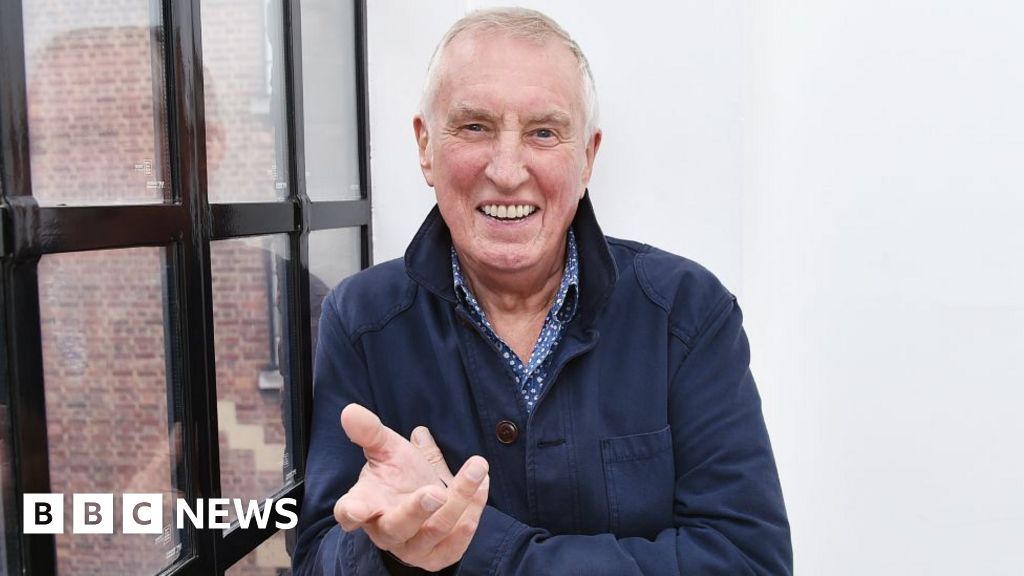Johnnie Walker hosted his final show on Radio 2 in October
Radio presenter Johnnie Walker has died at the age of 79, two months after calling time on his 58-year career because of ill health.
DJ Bob Harris, who took over BBC Radio 2’s Sounds of the 70s show after Walker’s retirement, announced his former colleague’s death live on the station on Tuesday.
Walker had pulmonary fibrosis, which is scarring of the lungs, a condition which makes breathing difficult.
He stepped down from presenting Sounds of the 70s and The Rock Show, also on Radio 2, at the end of October.
‘Rollercoaster ride’
Helen Thomas, head of BBC Radio 2, said: “Everyone at Radio 2 is heartbroken about the passing of Johnnie, a much loved broadcasting legend.
“He made Sounds of the 70s and The Rock Show appointments to listen to, sharing his personal memories and tales each week.
“He loved radio and inspired a generation of presenters, passionately promoting the artists and music he cared about so deeply.
“Johnnie’s wry sense of humour and his warm, open style of presenting ensured he was adored by his audience. The airwaves simply won’t be the same again. He will be very much missed by Radio 2 presenters, staff and listeners alike, and our thoughts are with his wife Tiggy and his children.”
Tiggy Walker said she “couldn’t be more proud” of her husband and “how he kept broadcasting almost to the end and with what dignity and grace he coped with his debilitating lung disease”.
“He remained his charming, humorous self to the end, what a strong amazing man. It has been a rollercoaster ride from start to finish,” she said.
“And if I may say – what a day to go. He’ll be celebrating New Year’s Eve with a stash of great musicians in heaven. One year on from his last live show. God bless that extraordinary husband of mine who is now in a place of peace.”
BBC director general Tim Davie described Walker as a “pop radio pioneer and champion of great music”, adding: “No-one loved the audience as much as Johnnie, and we loved him back.”
Getty Images
Walker had announced live on air earlier in October that he would be hanging up his microphone to retire.
He explained the reason he was retiring after reading out a letter from a listener whose dad had loved the show, but had passed away in 2022 due to pulmonary fibrosis.
“Now, that leads me to be making a very sad announcement,” he said.
“The struggles I’ve had with doing the show and trying to sort of keep up a professional standard suitable for Radio 2 has been getting more and more difficult, hence my little jokes about Puffing Billy, so I’ve had to make the decision that I need to bring my career to an end.”
Walker’s last episode of The Rock Show aired on 25 October, and his final episode of Sounds of the 70s was broadcast on 27 October.
At the end of his final show, Walker said: “[It’s] going to be very strange not to be on the wireless anymore. Also, by the same token, life will be slightly less of a strain really, trying to find the breath in order to do the programmes.”
“Thank you for being with me all these years and take good care of yourself and those you love and may we walk into the future with our heads held high and happiness in our hearts. God bless you.”
With Harris taking the helm for Sounds of the 70s, Shaun Keaveny took the reins for Walker’s Rock Show.
Walker began his radio career in 1966 on Swinging Radio England, an offshore pirate station, before moving to Radio Caroline.
He was recruited by BBC Radio 1 in 1969, then joined Radio 2 in 1997, where he remained until his retirement.
On his lunchtime Radio 1 show, which launched in 1971, he championed new names like Steve Harley, Lou Reed, Fleetwood Mac, The Eagles and Steely Dan.
He also spent time living in California in the 1970s before returning home in the 80s, re-joining Radio 1 in 1987. He also presented shows for Radio 5 Live.
On Radio 2, as well as Sounds of the 70s and the Rock Show, he presented a number of other programmes and documentaries over the years including the Drive show.
